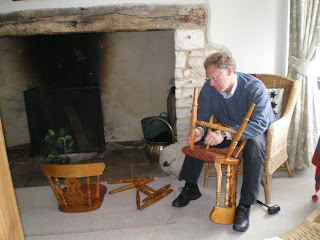I was in the Bodleian, holding a leather-bound 17th century poetic prayer in my hands, thinking about the relationship between the writer's life and my own, while looking out the beveled glass windows at clouds floating over the top of one of the Oxford Colleges, All Souls I think. I had just sent my manuscript in to the publisher and had time to explore for the fun of it -- no agenda, no commitments. Just the freedom to learn for the joy of it, and the time to consider and digest what I've read. Thank you, God.
Which makes saying goodbye to Oxford all the harder. There is no equivalent. Yet the challenge will be for me to invent ways to feed my spirit as I have done in this place, which seems so set up for it. But as C.S. Lewis yelled to Sheldon Van Auken as he ran across the High Street after their final meeting, "Christians never say goodbye!" Lord, I would love to come back some day.

We say goodbye to new experiences as well. Can you tell how excited (read: terrified) I am to try the national sport of England?

 No, that''s not Tina bowling. It's Helen Lake, daughter of our hosts, who took mercy on the American and let me hit it a few times. But I can now tell you the difference between a "four" and a "six," what an "over" is, and the difference between one-day cricket and a test match. This has to make me the Fresno expert on the sport.
No, that''s not Tina bowling. It's Helen Lake, daughter of our hosts, who took mercy on the American and let me hit it a few times. But I can now tell you the difference between a "four" and a "six," what an "over" is, and the difference between one-day cricket and a test match. This has to make me the Fresno expert on the sport.
We say goodbye to new friends, Deborah Lake and her husband Richard and kids, Helen and Matthew and Deb's mother Jennifer. We are so grateful for their openness and generosity, and we will never forget it. We will always remember the village of Eynsham, and their 300 year old home. I have the dents in my forehead and scalp to help me remember (low ceilings and doorways), although now I also have amnesia from the blows, so I won't remember how I got the dents.

And goodbye to old friends Ken and Phyl Bennett, former wardens of the North Oxford Overseas Centre where we once lived, who have continued to pray for us, serve us and love us over 18 years. Here, they took us to Stratford Upon Avon, the birthplace of Shakespeare. Also, goodbye to Venu, Geetha and Sangeetha who hosted us, fed us delicious Indian cuisine and taught us the joys of netlesss badminton.

Tina returns to work full-time next week. I enter phase two of the sabbatical -- planning for the our National Urban Program and personal future casting.
Goodbye Oxford, for now. We'll call you.
"Lord afford a spring to me,
And help me feel like what I see."
- John Newton
And help me feel like what I see."
- John Newton

























